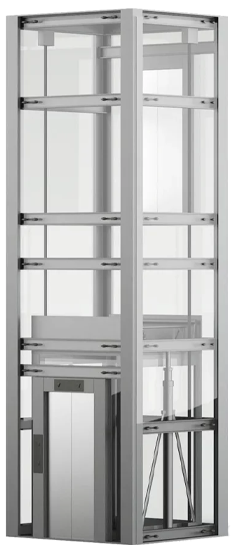Elevate your business with Our Top-Quality Commercial Lifts
Designed for performance, safety, and style, our solutions ensure efficient vertical transportation for any building size.
Lift Experts will shortlist the best options from 8 Original Equipment Manufacturers (OEMs) and provide a clear comparison, helping you choose based on value and cost.


Are you an architect, builder or developer planning your next lift project?
Lift Experts offers a wide range of lift solutions perfect for multi-level apartment blocks, clinics, childcare centres, medical centres, small hotels, hostels, and retiree villages. These projects often require lifts with higher weight-bearing capacities that can travel multiple floors. While these lifts may cost slightly more than a typical home lift, they remain economically viable. We have the ideal lift solutions to meet your needs and are ready to discuss your next project with you.
Another crucial factor to consider is fire ratings. Class 2 apartments, in particular, require fire-resistant materials to prevent fires from starting and spreading up the lift shaft.
Types of Commercial Lifts for Businesses in Melbourne and Sydney
Lift Experts simplifies choosing a commercial lift for architects, builders and developers and private business owners by offering a wide range of independent options. We conduct a needs analysis to recommend the best lift, considering space, machinery requirements, price, and customisation.
Lift Experts can collaborate with you to source the perfect elevator for your building. Our expertise in the latest elevator technology and commitment to environmentally friendly solutions ensures that our projects meet both modern standards and sustainability goals.
Electric Lifts - including Shaft
Electric Traction is the most commonly preferred option in Australian apartments and buildings, as it is smoother, cleaner, easy to maintain, and generally speaking, faster.
The typical configuration involves a lift car running inside a lift shaft, which can be either built-in or custom-made using steel and glass.
Hydraulic Lifts
Hydraulic lifts use hydraulic fluid to operate the lifting mechanism. While they are more commonly found in commercial settings, they can also be installed in residential homes.
Dumbwaiter Lifts
Dumbwaiter lifts are compact, efficient solutions for transporting items between floors in commercial settings like restaurants, hotels, and hospitals.
Designed to streamline operations and enhance productivity, these small freight elevators safely and conveniently move everything from food and supplies to documents and laundry, freeing up staff and improving workflow.
What Features can be Customised?
When installing a building or apartment lift, several elements can be customised to meet individual needs and preferences:
Cabin Design: Choose from various styles, materials, and finishes for the interior, including wood, metal, glass, and custom paint colours.
Door Types: Select from different door styles such as sliding, swing, or folding doors, and customise the finish to match your building’s décor.
Size and Shape: Adjust the dimensions of the lift cabin to fit available space and specific requirements, including different shapes like round, square, or rectangular.
Lighting: Choose the type and style of lighting, including LED, ambient, or accent lighting to create the desired atmosphere.
Safety Features: Add custom safety features such as emergency alarms, backup power systems, and intercom systems to ensure peace of mind.
Accessibility Options: Integrate features like wide doors, low control panels, and seating to accommodate individuals with mobility issues.
Initial consultation and site assessment
Provide us with some quick details about your elevator needs and Lift Experts will call you back for a quick needs analysis. The initial consultation takes 10-20 minutes and helps determine if a site visit is necessary. During the call, we’ll identify the type of commercial lift that suits your needs and budget. If we can’t offer a solution within budget, we’ll inform you, as sometimes there isn’t an option that works for both parties.
Why Choose Us for Your Commercial Lift in Melbourne and Sydney?
Lift Experts is technology and configuration agnostic, we operate with a vast list of independent manufacturers and lift types, and ensuring that the chosen solutions that best suit your needs is our mission. We source lifts from Asian and European suppliers, offering a full range from economical to fully customisable and stylish options. By maintaining a lean team and infrastructure and focusing solely on the equipment, we keep costs down and pass the savings on to you, while providing a wider range of choices.
FAQ's
What type of elevator is best suited for a commercial building like an apartment building or medical centre?
Commercial lift configurations are in great measure determined by established building standards and regulations, having a certified technical team that can provide a detailed lift spec, integration design and have a clear understanding of the installation and commissioning process is strongly recommended.
Generally speaking your first point of call is the Australian building regulation for commercial buildings (AS1735) with part 12 and part 16 the most recurrent set of norms.
How do I determine the appropriate capacity and speed for an elevator in a commercial setting?
Capacity and speed should be based on the building’s expected foot traffic and peak usage times. Consulting with an elevator specialist can help assess these needs and recommend suitable specifications.
What are the key considerations for elevator design in commercial buildings?
Key considerations include aesthetic integration with building design, compliance with accessibility standards (such as ADA), energy efficiency, and incorporating features like digital displays and security systems.
What is the typical installation timeframe for elevators in commercial buildings?
The installation timeframe can vary widely depending on the complexity of the project and the number of elevators being installed. Generally, it can take anywhere from a few months to over a year, including planning, permitting, and actual installation.
What ongoing maintenance is required for commercial elevators, and how often should it be performed?
Ongoing maintenance includes regular inspections, lubrication, safety checks, and prompt repairs of any issues. Maintenance should typically be performed monthly or quarterly, depending on usage intensity and manufacturer recommendations.
What regulations must be followed when installing a commercial lift in Australia?
Commercial lifts must comply with Australian Standards (AS 1735) and local building codes, which cover safety, accessibility, and fire regulations. Your certified installer will understand these requirements and ensure compliance.
What are the energy efficiency options for commercial lifts?
Many modern commercial lifts are designed with energy efficiency in mind, featuring options like regenerative drives, LED lighting, and energy-saving modes. These features can significantly reduce operational costs over time.
Why choose Lift Experts for your Apartment Lift Project?
We make sure it fits: Not only into the correct dimensions, but into your budget.
As an independent provider, we source lifts from the most suitable manufacturers and technologies to match your specific needs.
If you are needing multiple apartment lifts, then we can pass on a discount for ordering more than one.
What are the minimum safety standards I should ask for?
Standard safety features in commercial lifts include emergency alarms, intercom systems, automatic doors, safety brakes, and overload sensors. Additional safety measures, such as CCTV, fire-resistant materials, and backup power, can also be incorporated depending on the building’s requirements.
For a new Construction, when is the best time to install the Lift?
There are 3 elements that will determine the ideal time to install your lift:
- When the weather will have the least impact on the project
- When there are a minimal amount of finishes that can be damaged in the process: for example the floors.
- When there are a minimal amount of other trades that are involved in the area.
